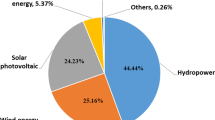Abstract
This study examines the effects of values, norms, perceived behavioral control, and education on intentions to save energy and actual energy-saving behaviors among residential energy customers (N = 329). A linear regression with ordinary least squares (OLS) estimates showed that environmental values, energy-saving norms, and perceived behavioral control did not have uniform effects on energy behaviors and the intention to conserve was not significantly correlated with energy-using behaviors. However, there is a link between perceived behavioral control and energy-saving behaviors. Respondents with higher educational attainment had greater intentions to conserve energy and an increased likelihood of engaging in energy-conscious behavior like turning off the television more frequently. Further exploration revealed that a considerable portion of the effect of education was due to the mediating effect of perceived behavioral control and not due to increased pro-environmental values or norms.


Similar content being viewed by others
Notes
1The latter list substituted for the customers of Another Energy Company which declined participation in the research. InfoUSA produces lists which lean toward home ownership as they combine magazine subscriptions, census data, tax assessment records, voter registration lists, and the like. Relying on the InfoUSA list for two thirds of the county’s residential sector biases the results toward single-family homes, non-Hispanic-White households, and owners as opposed to renters. For example, there were more renters among City Utilities Commission clients than among the other company’s clients. Unfortunately, the lower representation of renters and Black and Hispanic households limits possible comparisons: we are only able to contrast the responses of non-Hispanic Whites (NH Whites) to those of non-White residents. The racial composition reported by the 2010 US Census indicates the sample bias toward the White population: the proportion of non-Hispanic White people in the Census is 46 %, while in our sample, 81 % of the respondents are non-Hispanic Whites. For Black households, comparable proportions are 19.5 % in the US Census and 7 % in this sample; for Hispanic households, 27 % in the US Census and 9 % in this sample. Thus, based on Census 2010 data, the county does not have a majority racial group: none of the racial groups comprises more than 50 % of the county residents.
References
Abrahamse W, Steg L, Vlek C, Rothengatter T (2005) A review of intervention studies aimed at household energy conservation. J Environ Psychol 25(3):273–291
Ajzen I (1991) The theory of planned behavior. Organ Behav Hum Decis Process 50(2):179–211
Ajzen I, Fishbein M (1977) Attitude-behavior relations: a theoretical analysis and review of empirical research. Psychol Bull 84(5):888–918
Baron RM, Kenny DA (1986) The moderator–mediator variable distinction in social psychological research: conceptual, strategic, and statistical considerations. J Pers Soc Psychol 51(6):1173–1182
Black JS, Stern PC, Elworth JT (1985) Personal and contextual influences on household energy adaptations. J Appl Psychol 70(1):3–21. doi:10.1037/0021-9010.70.1.3
Canan P, Pals H, Rivera F (2010) Ethnic determinants of residential energy consumption and conservation. Sustainable Florida Conference. West Palm Beach, FL
Chen X, Peterson MN, Hull V, Lu C, Lee GD, Hong D, Liu J (2011) Effects of attitudinal and sociodemographic factors on pro-environmental behaviour in urban China. Environ Conserv 38:45–52
Cheung SF, Chan DK-S, Wong ZS-Y (1999) Reexamining the theory of planned behavior in understanding wastepaper recycling. Environ Behav 31(5):587–612
Clark WA, Finley JC (2008) Household water conservation challenges in Blagoevgrad, Bulgaria: a descriptive study. Water Int 33(2):175–188
Corraliza JA, Berenguer J (2000) Environmental values, beliefs, and actions: a situational approach. Environ Behav 32(6):832–848
Dietz T, Gardner GT, Gilligan J, Stern PC, Vandenbergh MP (2009) Household actions can provide a behavioral wedge to rapidly reduce US carbon emissions. Proc Natl Acad Sci 106(44):18452–18456
Fujii S (2006) Environmental concern, attitude toward frugality, and ease of behavior as determinants of pro-environmental behavior intentions. J Environ Psychol 26(4):262–268
Hines JM, Hungerford HR, Tomera AN (1987) Analysis and synthesis of research on responsible environmental behavior: a meta-analysis. J Environ Educ 18(2):1–8
Howell SE, Laska SB (1992) The changing face of the environmental coalition: a research note. Environ Behav 24(1):134–144
Hunter L (2004) Cross-national gender variation in environmental behaviors. Soc Sci Q 85(3):677–694
Johns KD, Khovanova KM, Welch EW (2009) Fleet conversion in local government. Environ Behav 41(3):402–426
Kalafatis SP, Pollard M, East R, Tsogas MH (1999) Green marketing and Ajzen’s theory of planned behaviour: a cross-market examination. J Consum Mark 16(5):441–460
Kollmuss A, Agyeman J (2002) Mind the gap: why do people act environmentally and what are the barriers to pro-environmental behavior? Environ Educ Res 8(3):239–260
Lam S-P, Chen J-K (2006) What makes customers bring their bags or buy bags from the shop? A survey of customers at a Taiwan hypermarket. Environ Behav 38(3):318–332
Leiserowitz A, Maibach E, Roser-Renouf C, Smith N (2011) Global warming’s “Six Americas”: May 2011. Yale University and George Mason University. Yale Project on Climate Change Communication, New Haven
Midden CJH, Ritsema BSM (1983) The meaning of normative processes for energy conservation. J Econ Psychol 4(1–2):37–55
Neuman K (1986) Personal values and commitment to energy conservation. Environ Behav 18(1):53–74
Nolan JM, Schultz PW, Cialdini RB, Goldstein NJ, Griskevicius V (2008) Normative social influence is underdetected. Personal Soc Psychol Bull 34(7):913–923
Oreg S, Katz-Gerro T (2006) Predicting proenvironmental behavior cross-nationally. Environ Behav 38(4):462–483
Rotter JB (1966) Generalized expectancies for internal versus external control of reinforcement. Psychol Monogr Gen Appl 80(1):1–28
Rotter JB (1990) Internal versus external control of reinforcement: a case history of a variable. Am Psychol 45(4):489–493
Schultz PW (2002) Knowledge, information, and household recycling: examining the knowledge-deficit model of behavior change. In: Dietz T, Stern PC (eds) New tools for environmental protection: education, information, and voluntary measures. National Academy Press, Washington, DC, pp 67–82
Scott D, Willits FK (1994) Environmental attitudes and behavior: a Pennsylvania survey. Environ Behav 26(2):239–260
Stern PC, Dietz T, Guagnano GA (1995) The new ecological paradigm in social-psychological context. Environ Behav 27(6):723–743
Taylor S, Todd P (1995) An integrated model of waste management behavior. Environ Behav 27(5):603–630
Terry DJ, Gallois C (1993) The theory of reasoned action: its application to AIDS-preventive behavior. Pergamon Press, Oxford
Tindall DB, Davies S, Mauboules C (2003) Activism and conservation behavior in an environmental movement: the contradictory effects of gender. Soc Nat Resour Int J 16(10):909–932
van Birgelen M, Semeijn J, Keicher M (2009) Packaging and proenvironmental consumption behavior. Environ Behav 41(1):125–146
Vandenbergh MP, Stern PC, Gardner GT, Dietz T, Gilligan JM (2010) Implementing the behavioral wedge: designing and adopting effective carbon emissions reduction programs. Environ Law Report 40:10547–10554
Acknowledgments
Both authors would like to thank Dr. Penelope Canan, Professor Emerita at the University of Central Florida, for her inspiration, encouragement, and mentorship, throughout this project.
Author information
Authors and Affiliations
Corresponding author
Rights and permissions
About this article
Cite this article
Pals, H., Singer, L. Residential energy conservation: the effects of education and perceived behavioral control. J Environ Stud Sci 5, 29–41 (2015). https://doi.org/10.1007/s13412-014-0196-6
Published:
Issue Date:
DOI: https://doi.org/10.1007/s13412-014-0196-6




